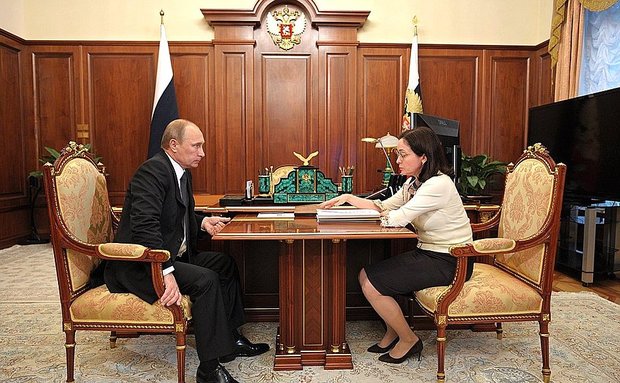Foreign investors credit Elvira Nabiullina for Russian markets’ rise
Global investors return to Russian markets in response to positive shifts in the economy, and it is Elvira Nabiullina who helped to restore their faith. Market indexes and national currency show a visible growth at the moment. But the changes can be short-term since country's economy is still very commodity-dependent and needs some structural reforms.
International investors start coming back to Russia, and this is largely a merit of Russian Central Bank's head, according to The Wall Street Journal. Though Nabiullina's decisions of cutting Russian ruble's bind to the dollar in 2014, and then increasing interest rates considerably, were quite unpopular and painful for the country's economy, now it seems that they did the job. After the followed hard recession, national currency's collapse and inflation rise, some positive changes emerged.

The MICEX index, based on prices of most liquid Russian stocks, showed an all-time peak in the beginning of September. It added 25% in 2016, and this made MSCI Inc. rank Russia the sixth among 23 emerging countries they monitor. Besides, the Russian ruble this year has gained 13% against the dollar, showing the third result among all emerging currencies. Local-currency bonds were also ranked third by J.P. Morgan Chase & Co.
'The correct steps taken by the Russian Central Bank have restored confidence in the ruble and its macroeconomic policy,' said Andrey Kutuzov, an associate portfolio manager of the Wasatch Emerging Markets Small Cap fund. As a result, $1,3 billion have been added to funds investing in Russian bonds and stock by global investors. Major players are coming back: Wasatch Fund, left Russia at the end of 2014, now returned with large investments in Lenta LLC retailer.
However, Russia still remains in recession. The International Monetary Fund predicts the country's medium-term potential growth of only 1,5% a year. Besides, the essential driver of emerging markets' rebound are reduced expectations of the Federal Reserve interest rate increases. If the rate goes up, it can boost the U.S. dollar's value depreciating national currencies and making the dollar-denominated debts more expensive.
So many analysts have a critical attitude considering the market rise to be as the short-term one. They suppose it to outpace the real political and economic situation and declare the need for significant structural reforms such as opening labor markets and revamping government-related enterprises. Other developing countries such as Argentina, India, Indonesia or Mexico have commenced their reform processes already, but not Russia. The economy is very little diversified and a highly commodity-dependent, and the markets need to become more transparent and credible. Otherwise, oil prices fall or expectations for the Federal Reserve rate increase rise, it can affect negatively on the economy of Russia (and other reform-needing growing markets, e.g. South Africa or China). For instance, the ruble lost 1,4% against the dollar when crude oil fell by 3%.
Despite all that risks, Russian markets attract investors. Robert Neithart, a fixed-income portfolio manager at Capital Group, which manages about $9 billion in emerging-market debt, said the firm is sticking with its holdings of ruble-denominated bonds, citing decent economic fundamentals. Russia's ruble-denominated government bonds with a yield of 9,1% look engaging against rich-country bonds with a near-zero profitability. And if the Central Bank of Russia keeps its promise to bring inflation down from 7% in 2016 to 4% in 2017, it can also raise bond prices.
Thus, plenty of investors is ready to take 'hard-to-measure risks that are unique to Russia', including Vladimir Putin's foreign policy and geopolitical ambitions, to obtain a worthy reward.